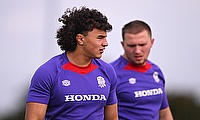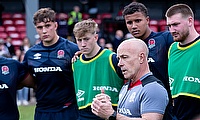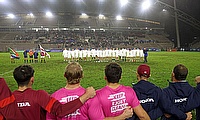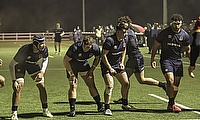England Under-20s aim to ‘increase efficiency’ in attack
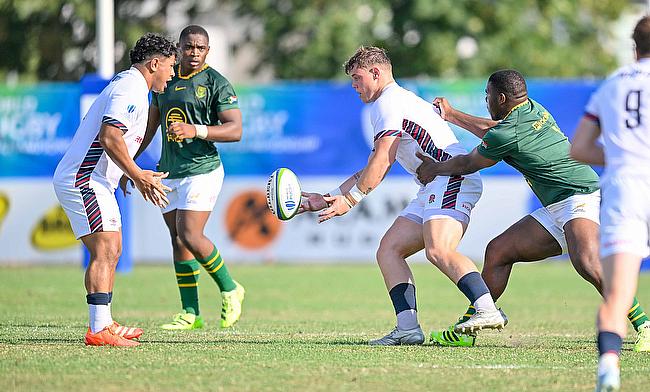
England need to be accurate against Australia if they are to secure their desired result
©Maurilio Boldrini / World Rugby
Following a narrow defeat to South Africa last Friday, England must secure a bonus-point victory against Australia - and rely on other results - to progress to the semi-finals and keep their hopes alive of becoming back-to-back world champions.
While the situation is far from straightforward, Parkin believes the signs are encouraging.
“English rugby is in a good place,” said Parkin, who took over as the Under-20s attack coach ahead of this year’s championship and has been involved in the England Rugby pathway for the past three years.
“If you look at the first half against Scotland and South Africa, we were really effective when we got into the 22 and came away with points. However, in the second half against South Africa, we had multiple entries into their 22 but couldn’t seem to convert those into points.”
In the wake of the 32-22 defeat to the Junior Boks, England head coach Mark Mapletoft has reshuffled his backline, handing Saracens’ Noah Caluori his first start and naming Bath flyer Tyler Offiah on the opposite wing.
Despite making four changes among the backs, Parkin highlighted clear progress in England’s attacking structure and efficiency since the Six Nations.
“The improvement in the amount of entries into the opposition 22 since the Six Nations has increased significantly,” he says. “That’s a big step forward for us. The next step for us is increasing our efficiency which is something we have worked on this week going into Australia.
“I think across the backline, we’ve got some really special talent. What’s exciting is that we’re even missing players like Angus Hall and Henry Pollock, who have pushed on but that’s opened the door for other lads to step up and take their opportunities.
“Noah has been very exciting. He’s one of the best high-ball athletes I’ve ever worked with, and as an Under-18 in this set-up, he’s shown a real hunger to learn and improve.”
Parkin credits much of England’s collective progress to a sharper focus on passing accuracy and the introduction of tactical frameworks aimed at maximising attacking opportunities.
“A big focus for us has been backs’ passing accuracy,” he adds. “We're up to 93 per cent, which is a really strong level. We’ve also introduced FBA (Four Backs Attached) which aims to have four backs able to move the ball effectively at any stage of play.”
Parkin and his fellow coaches will be hoping that’s reflected in Verona, as England aim to rediscover the exciting, dynamic rugby they showed against Wales in their warm-up matches as well as earlier in the tournament.
“I want every player, from 1 to 15, to feel confident with the ball in hand. That’s the way we train,” Parkin explains. “You saw an example of that in the try we scored against South Africa, where forwards Kepu Tuipulotu and Ralph McEachran combined brilliantly to set up Connor Treacey.”
Parkin’s commitment to attacking rugby stems from his time at Northampton, where he learned a great deal under Sam Vesty and Chris Boyd.
Asked why he prefers this style of play, Parkin was clear about his philosophy.
“We’re in the business of entertainment, and we want to play entertaining rugby. I genuinely believe that when the ball is in play, it creates more opportunities for players to improve and that’s ultimately my job at this level, to help these players get better.
“When I plan a session, the first two questions I ask myself are: ‘Will the players get better, and is it going to be enjoyable and competitive?”
And another key part of his coaching approach is allowing players to take ownership, both in training and on the pitch.
“I think it’s an interesting one when it comes to decision making,” he adds. “It’s all about how you train. If you're constantly telling players what to do during sessions, that will carry over into matches so I try to make our sessions, on and off the field, as player-led as possible.”
“Our backs and attack meetings are run by the players, with coaches there for guidance and support.”
That player-led approach was put to the test in the tight loss against South Africa, where England opted against taking a late penalty kick that might have earned them a crucial bonus point.
“You could argue that we should have taken the tee on against South Africa, and maybe we'd be in a stronger position now but that’s a great learning moment,” Parkin admits. “For these young players, the experience of making those decisions under pressure is crucial for the next time they’re in that situation.”
And the next ‘situation’ for England comes on Wednesday evening against Australia.
England must secure a bonus-point victory to keep their semi-final hopes alive, while Australia arrive in Verona in mixed form, having been thrashed 73-17 by South Africa before responding with a 34-24 win over Scotland.



